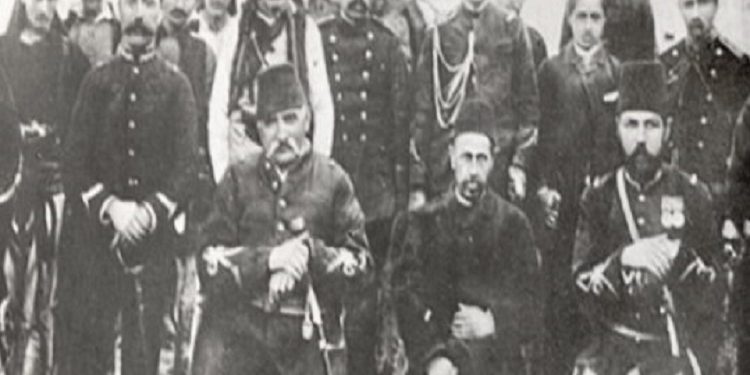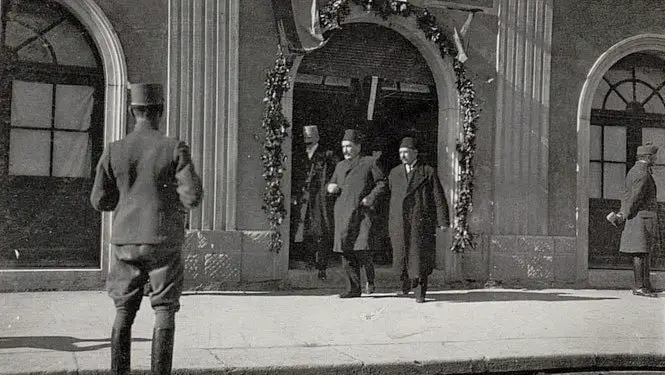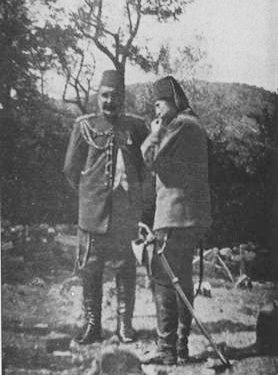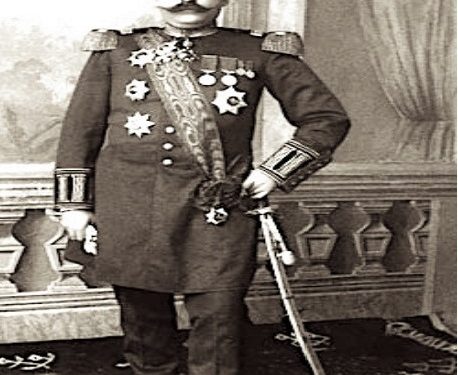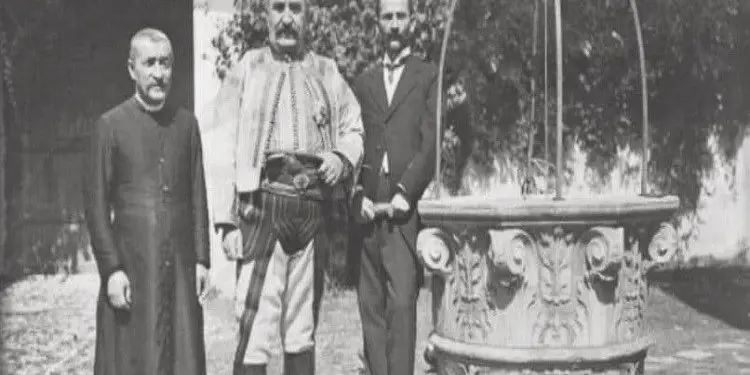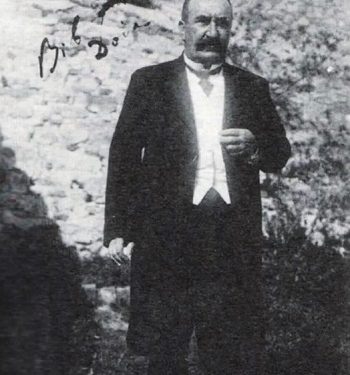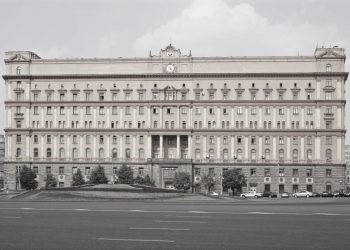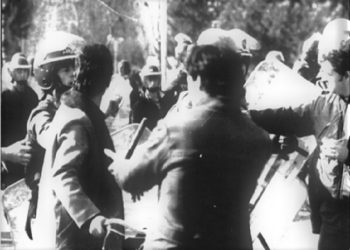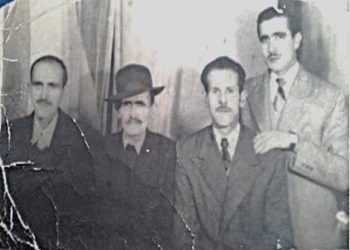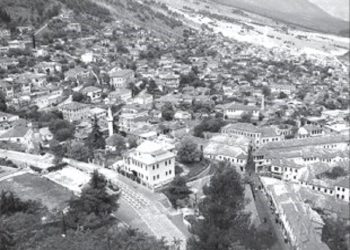By Dr. Nikol Loka
Part twenty-one
“PRENGA BIBE DODA, THE SHADOWS OF A CITIZENSHIP”
Memorie.al / The newest book “Prengë Bibë Doda, a phenomenon in Albanian political life”, by researcher Nikollë Loka, not only expands the scope of historical studies on Mirdita, the Door of Gjonmarkaj and the figure of the Mirdita Prince, Prengë Bibë Doda, but it is also a contribution to national historiography. The very rich archival material, the literature used or consulted, oral traditions, etc., make this book a real study treasure, giving the science of history a scientific monograph that enriches our knowledge of Mirdita, its captains, tradition, history etc. To study such an important and complex figure, as the figure of Prengë Biba Doda, is a high scientific responsibility that not everyone undertakes. Nikollë Loka, has done a great job of research and treatment by the professional researcher, giving us the portrait of the prince and the general Mirditor, with the true contours. Dr. Loka has adhered to the end of the space and time, in which the multidimensional events and their protagonists have developed.
THE MONOGRAPH “ABOUT BIBË DODA, A PHENOMENON IN ALBANIAN POLITICAL LIFE”, A VALUABLE SCIENTIFIC STUDY THAT ENRICHS THE FUND OF OUR HISTORICAL STUDIES
(By Mr. Sc. Murat Ajvazi, March 2017, Switzerland)
Continues from last issue
“Even if these statements of Preng Pasha are intended to justify his separatist tendencies, still from the behavior of this leader, I believe that I have proven my point of view, expressed in my confidential report, number 50, dated August 1 of this year, according to which; “the Albanian national idea is completely foreign to the Catholic tribes of the Highlands, this is due to their low cultural level”, (417)- is written in a report of the Austro-Hungarian Legation in Cetina.
The absence of Prince Biba Dod,a in the important political processes that accompanied the declaration of Independence, negatively affected his affirmation as a political figure of national proportions. His separatist tendencies typified him as a localist politician, although when he was engaged in governing functions, he worked to strengthen nationwide unity. However, for the period January – August 1913, Prenga was considered problematic and against efforts for national unification.
The Austro-Hungarian consulate in Shkodër and the embassies in Rome and Cetina closely followed the activity of Prenga in these two countries. In his report, Consul Zambaur writes: “Following my letter dated the 11th of this month, which talks about the relations of Preng Pasha in Italy and Montenegro, I take permission to announce the following: I had the opportunity to I took a look at a letter that Archbishop Nikoll Sereqi’s nephew sent from Vienna (“Hotel de France”) on the 17th of this month to his uncle Pashk Sereqi, who, due to known revenge, is staying in Kastra. In that (letter), there is an addendum that was written by the hand of Prengë Bibë Doda, and intended for the archbishop, according to which, the writer announces his intention to put himself in charge of the Albanian movement and to going to the Highlands by way of Montenegro, where he wants to have a conversation with King Nicholas.
He then asks to find out from the archbishop how the highlanders would judge this decision of his. Monsignor Sereqi, who has little consideration for Prenga Pasha, just like the highly influential chiefs of the mountains of Mbishkodra, if he has to answer, – there is a possibility that it (answer) will be evasive. Against me, he undermined Biba Doda’s plans, emphasizing that these and other newer ones have to do with his shaky intentions and, perhaps, with his material disillusionment. After extracting from Italy what was possible, Prenga has now connected with the proposal made by Prince Mirko in Porto Rose and returned to Montenegro”. (418)
Although promising in Rome, Prenga had no intention of appearing publicly in favor of Montenegrin projects in Cetina, including those that were contrary to Italian or Austro-Hungarian interests. Diplomat Ledinegg, from Tivar, wrote to Berchtold in Vienna: “From Italy, Prengë Bibë Doda arrived yesterday in Tivar. He declared to some of his compatriots that he had come to inform them what the Montenegrins think about the further fate of Albania, when it is known that they had denied the Albanians any ability for self-administration. Prenga, had expressed the opinion that; “Albanians could develop from a national point of view, even under Montenegro. The “courageous” patriot, who probably acquired these political thoughts from some Montenegrin tip, or in the hope that he can get one, had a conversation here with the Bajraktar Vat Marashi, Shkreli’s prisoner of war. The captain left today for Rijeka, accompanied by the local mayor and will be received in audience by the King (of Montenegro). (419)
Prenga had met with the Montenegrin King and asked for his consent to; the “declaration of independence” in the territories where he thinks the “Principate” devised by him will extend. While this action conflicted with Austrian interests, and he understood well that Vienna wanted the union of the entire Albanian factor, for the strengthening of the state in all its territories. Although they knew these compromising facts and were following the meetings of the Head of Mirdita with interest, the Austro-Hungarian and Italian diplomacy preferred to use the stick and the carrot against him.
According to the Austro-Hungarian consul in Cetina; “since yesterday, Prengë Biba is here. Here is also the King, who arrived by special train from Antivari”. (420)
The Austro-Hungarian diplomat from Cetina, Gisel, informed his Ministry of Foreign Affairs, regarding the diplomatic activity of Prenga: “Prenga Bibë Doda, sent me his loyalist, Dr. (Anton) Sadedinin, who informed me that with the consent of Montenegro, he would return to his homeland, passing through Shengjin. In Orosh, he would proclaim the independence of the Catholic Albanians, that is, the Mirditors and the Highlanders. He has not yet met with King Nicholas and has only asked for facilities for the trip to Albania. The answer has not been given yet. Sadedin assured me that his superior was unquestionably loyal to the (Austro-Hungarian) Monarchy and he would act in support of our policy. He asks for financial support, which should be sent to Kotorr, where he is leaving today, within 3 or 4 days”. (421)
In another relation, Giesel, informs that; The head of the Mirditas, had been able to provide some financial support. “It’s been four days since Prengë Bibi Doda is here again, but without approaching me or my Italian colleague. With the help of an Italian bank, he received here several thousand francs, allegedly from the purchase price, for the previously sold forest. Bibë Doda, urgently requested from the King, 3000 rifles, to act on the Mirditas, in support of the Montenegrin policy, but without success. (422)
After finishing work with the Montenegrins, Prenga approaches the Austrians. The Austro-Hungarian ambassador, von Merey, from Rome, writes: “The local correspondent of the “Railpost” newspaper (Mayerhofer) informed me that he had talked with the head of the mirditors, Prengë Bibë Doda. The latter claims that the King of Montenegro called him to make propaganda for Montenegro among the Mirditors. The mentioned one intends to travel from Cetina to Albania, but he does not think of putting himself in the service of King Nicholas. He wants to influence the Mirditors, to unite with that part of the highlanders, who takes a stand against Montenegro, because they have not received sufficient assurances from the King, regarding autonomy”. (423)
Studying the marked eclecticism and pragmatism of the Prince of the Sun, the Austro-Hungarian Ambassador in Rome, Von Mere, proposes to the Ministry of Foreign Affairs in Vienna, another attitude towards Prenga, different from the one held by the Austro-Hungarian consul in Shkodër, Zambaur. “Taking into account the delicate situation and since we do not have much faith in Prengë Pashë Bibë Doda, I would advise that a position be taken against Von Zambaur’s position”. (424)
The Plenipotentiary Minister in Cetina, Gisel, has serious remarks about Prengë’s attitude, who, after closely following his attitude in Montenegro, proposes: From the conversation with Sadedin, I understood that Prengë Bibë Doda, did not know the provisional government ( of Vlora) and would act with his head, because it was left aside, by Ismail Qemal Bey. It would be sold to whoever would offer the most, be it Italy, Austria-Hungary or Montenegro. (425)
In support of Your Excellency’s telegram, number 128, dated the 5th of the following month, I had the opportunity to express myself and emphasize that, Prengë Bibë Doda, it would be good to first of all protect the Albanian national idea. I also emphasized that the imperial and royal (Austro-Hungarian) government would look at his stay in Mirdita, appreciate it as it should, and in case of need, help him. (426)
A concern for Austro-Hungarian diplomacy, the close relations of Bibë Doda’s family with France had continued. With the support that France had given to Prengë Bibë Doda, in his separatist efforts, he had attracted Austrian attention. “In a conversation that Poincare had with Pichon, it was decided that Mirdita will be known as Prince on its own, under French protection.” (427)
The head of Mirdita, who was received in Paris, by Mr. Poincare and Pichon and, from the latter, was given support to declare Mirdita as; “Independent princes, under the protection of France”. Normally, this should arouse the resentment of Italy, but the Italians could not break with Prenga Biba Doda, because there was a possibility of failure, the large forest concession, which they had obtained permission to exploit, inviting the inhabitants to revolt. (428)
Captain Gjonmarkaj leaned very much towards localism and despite the nationwide commitment, he remained, in a certain sense, the leader of the northerners. This political tactic served to always stay on the political stage, where accounts were made on the divisions that existed in the Albanian reality: Gegë-Toskë; Muslim-Orthodox-Catholic; then the provincial divisions. In the fragile situation of the Albanian issue, the positions of Prengë Bibë Doda, for the cantonization of the Albanian territories or for the “Catholic Principality”, were harmful, while efforts were being made to escape from that reality that actually existed.
Austro-Hungarian and Italian diplomacy considered Prenga; “a politician who works against their interests”. This position is clearly expressed in diplomatic relations: “As far as it is concerned, in Your Excellency’s telegram, number 229, dated the 5th of this month, I received the following telegram from Baron Giesl on the 4th of this month: belongs to Prengë Pasha (Bibë Doda), the instructions agreed with the Italian government were sent to Cetina and Durrës. They will be sent to Shkodër as soon as possible. All measures have been taken so that our representatives, against the head of the day, act according to these instructions. (429)
What are those instructions? In the instructions that the Minister of Foreign Affairs of Austria-Hungary, Count Berchtold, gives to his Ambassador in Rome, he clarifies the cooperation, between Vienna and Rome, in relation to Prenga, when he writes: “According to the authorization, the Duke of Avarna, informed me today that his government has granted financial assistance to the Albanian Prengë Bibë Doda. In undertaking this action, the Marquis of San Giuliano started from the idea that, in the opposite case, the aforementioned could turn to the Serbian government.
The ambassador informed me of his government’s intention to provide Prengë Bibë Doda with instructions, instructions that must be set in cooperation with us. I agreed with the Duke of Avarna that the instructions should be summed up in the following sense. The president in question must agree with other Albanian leaders to put all their forces into action for the common issue. To avoid that everyone goes according to his own head. They must stop any quarrel between the tribes; try to maintain order and peace; put religious differences aside and unite as brothers among themselves.
Albanians should bear in mind that now is the time to commit everyone to the country’s autonomy and stop any foreign intervention. Your Excellency, have the kindness to communicate to the Marquis di San Giuliano that, considering his past, I have little faith in the person of Prenga Biba Doda. However, I will agree that in addition to material assistance, an order in the above sense is also sent to him. Since for now, I do not know the location of the Albanian in question, your lordship, have the kindness to ask Mr. Minister, to which consular office, the relative order should be addressed”. (430)
Vienna’s diplomacy knew well the Head of the Mirditas and the complexity of his behavior. Efficient measures had to be taken that forced him to work in accordance with the Austro-Hungarian and Italian interests, which at that time coincided to some extent with the national interests of the Albanians.
To hinder Prenga in his activity, the Austro-Hungarian diplomat in Cetina, Weinzel, suggested that; “to switch from diplomatic language, to open propaganda activity, against his actions”. “Perhaps it would be appropriate that as soon as the propaganda of Prenga Pasha and the means used are found to be unsuspicious, it should be fought with the same weapons. It is difficult to expect a continuous success, only from the strength of the word of the Catholic Clergy, from whom, a complete ‘buona fides’ must always be presupposed. This is because, the continuous failure of these interventions near the mountain tribes, is a fresh memory both in the case of the movement of the mountaineers, last year, and from the prehistory of the current war. (431)
As a means of pressure, financial aid was used against Prenga – since Vienna and Rome had been giving him subsidies for years. Count Berchtold, in the instructions for his diplomats in Cetina and Durrës, among other things, writes: “In relation to Biba Doda, an aid of 6,000 francs was approved from Italy and at the moment he may have been promised some second aid. The cabinets of Vienna and Rome have decided to give joint instructions to the authorities of their representative offices, to say the following words to the chief in question: other Albanian leaders, cooperating with them, for the strengthening of Albanian autonomy.
His efforts should go towards eliminating the differences between the different tribes and leaders; he must influence among them, to dominate the order and fraternity regardless of religion. The only goal that every Albanian should have before his eyes is the autonomy of the homeland, its protection from any infringement and the prohibition of any foreign intervention. In case your lordship will meet with him, please speak as above and have the respect to add that; “continuation of subsidies to him will depend on compliance with the above advice. Finally, I am asking you to transmit the above instruction to Shkodra, respectively to the Consul General, von Zambaur, as soon as the earliest and surest case presents itself”. (432)
Initially, it was thought that the Catholic part of the North would join the Government of Vlora even without the support of Prenga. Kaçorri and Gurakuqi were committed to raising the national flag in those territories after the departure of the Serbian forces, so that they would join the Provisional Government. The flag was raised in the Assembly of Rubiku, Perlat (433) and Kthella. (434) In the same way, they committed themselves that all the territories of Northern Albania should recognize the Government of Vlora. In view of this goal, on December 26, 1912, Nikollë Kaçorri held a meeting in Orosh of Mirdita, with the participation of Mati, Mirdita, Dibra, Puka, Malësi e Lezha, Dukagjin and Bregu t Mata, with the aim that the representatives of the provinces of mentioned above, to recognize the government of Vlora. (435)
But Mirdita, in the absence of its own Prince, was governed through Captain Marka Gjoni and Abbot Prend Doçi. The province did not join the Government of Vlora, until Prenga returned from abroad and assumed functions in that Government. The merger of Mirdita with the Government of Vlora was made only under the conditions of political benefits for Biba Doda, who received the portfolio of number two of the state. In the absence of Prenga’s will, for national unification, this process in Mirdita was not accelerated even by the clergy, who had been waiting for liberation from Turkey, because Abbot Doçi had become a political advisor for the prince and was engaged with his cause. While the Austro-Hungarian government behaved harshly, the Italian one behaved more gently. The Italians were not interested in breaking with Prengë Bibë Doda, because their plans for Albania would be ruined. (436)
The tendency of the government of Rome, to put the influence of Prengë Bibë Doda at its service, has to do with the considerations that the consulate had for the Milanese firm “Vismara”. In an Italian diplomatic report, it is written: “By influencing the Duke of Avarna, efforts will be made for Italy to directly influence the political plans of Prenga Biba Doda, and in this case, the argument that the formation of Mirdita will be brought to the fore as an independent administrative unit, under a hereditary president, it will look like a state within a state and contrary to the idea of creating a modern Albanian state. Therefore, granting the subsidy should be done after his correct attitude and this should be told as your private attitude” (437)
Apparently, Prenga did not heed the advice and then the Ministry of Foreign Affairs in Vienna gave instructions to Ambassador Von Merey in Rome, that; “to be told to San Giuliano; that since the beginning of this year, the Austro-Hungarian state had removed from the head of the Mirditas, the subsidy he had been receiving for ten years, because during the current crisis, despite all the warnings and repetitions to return to the Motherland and put all the forces in the service of his country, has insisted on wandering abroad and conspiring with Serbia and Montenegro, in order to put himself at the head of an independent principality, from the Balkan states in Northern Albania . (438) Memorie.al
The next issue follows
- Confidential report from the Legation of Austria-Hungary in Cetina, for the Minister of Foreign Affairs, Berchtold, where it is informed about the movements of Prengë Bibë Doda and his views on the cooperation of Catholic Albanians with Muslim and Orthodox ones. Rap. No. 104/B, Confidential, Cetina, on December 17, 1912, Albania in Austro-Hungarian documents (1912), Volume VII, Center for Albanian Studies, Institute of History, prepared by Marenglen Verli, Ledia Dushku, Tirana 2014, p.79-81
- Highly confidential information of the Austro-Hungarian consul, Zambaur, sent from Shkodra to Minister Berchtold, regarding the shaky actions of Prengë Bibë Doda, and the poor reputation he enjoys in the Great Highlands, Consulate General – Shkodra, Albania, registered on 11 November 1912, Albania in Austro-Hungarian Documents (1912) Volume VI, prepared by: Marenglen Verli, Ledia Dushku, Albanological Publications, 2012, Center for Albanological Studies, Institute of History, Tirana, P.146-147
- Notice of the diplomat Ledinegg from Tivari, sent to the Minister of Foreign Affairs, count Berchtold, where they are informed about the arrival there of Prengë Biba Doda, No. 37, Tivar, on December 2, 1912, Albania in the Austro-Hungarian Documents (1912) Volume VI, prepared by: Marenglen Verli, Ledia Dushku, Albanological Publications, 2012, Center for Albanian Studies, Institute of History, Tirana, p.406
- Cipher telegram of Baron Gisel from Cetina, to the Minister of Foreign Affairs of Austria-Hungary, Count Berchtold, regarding Prengë Bibë Doda and cooperation with him, No. 766, Tel. 194, Cetinë, on December 4, 1912, Albania in Austro-Hungarian Documents (1912) Volume VI, prepared by: Marenglen Verli, Ledia Dushku, Albanological Publications, 2012, Center for Albanian Studies, Institute of History, Tirana, p.424
- Cipher telegram of Baron Gisel from Cetina, to the Minister of Foreign Affairs of Austria-Hungary, Count Berchtold, regarding Prengë Bibë Doda and cooperation with him, No. 766, Tel. 194, Cetinë, on December 4, 1912, Albania in Austro-Hungarian Documents (1912) Volume VI, prepared by: Marenglen Verli, Ledia Dushku, Albanological Publications, 2012, Center for Albanian Studies, Institute of History, Tirana, p.424
- Encrypted telegram of baron Giesl, minister of Austria-Hungary accredited in Cetina, with which Prengë Biba Doda’s flirtations with the king of Montenegro, in order to secure money and weapons, are reported, No. 2748, Tel. No. 207, Cetina, on December 13, 1912, Albania in Austro-Hungarian documents (1912), Volume VII, Center for Albanian Studies, Institute of History, prepared by Marenglen Verli, Ledia Dushku, Tirana 2014, p.55
- Digit telegram of the Austro-Hungarian ambassador, von Merey from Rome, sent to his superiors at the Ministry of Foreign Affairs, regarding Prengë Bibë Doda and his views, No. 6521, Tel. No. 203, Rome, on November 27, 1912, Albania in Austro-Hungarian Documents (1912) Volume VI, prepared by: Marenglen Verli, Ledia Dushku, Albanological Publications, 2012, Center for Albanological Studies Institute of History, Tirana, p.343-344
- Count Aehrenthal’s telegram sent to Consul Zambaur and Ambassador Pallavicini, where Zambaur’s attitude towards Preng Pasha Bibë Doda is opposed, No. 5003, No. 13 figure Pera, on January 14, 1912, Albania in the Austro-Hungarian documents (1912), Volume I, preparation and editing Beqir Meta and Sokol Gjermeni, Albanological Publications, 2014, Center of Albanological Studies, Institute of History, p.104
- Report of the Minister Plenipotentiary, Geisl, from Cetina, to the Minister of Foreign Affairs of Austria-Hungary, Count Berchtold, regarding Prengë Bibë Doda and the cooperation with him, No. 102 – B, Cetina, on December 6, 1912, Albania in Austro-Hungarian Documents (1912) Volume VI, prepared by: Marenglen Verli, Ledia Dushku, Albanological Publications, 2012, Center for Albanological Studies, Institute of History, Tirana, p.442- 443
- Report of the Minister Plenipotentiary, Geisl, from Cetina, to the Minister of Foreign Affairs of Austria-Hungary, Count Berchtold, regarding Prengë Bibë Doda and the cooperation with him, No. 102 – B, Cetina, on December 6, 1912, Albania in Austro-Hungarian Documents (1912) Volume VI, prepared by: Marenglen Verli, Ledia Dushku, Albanological Publications, 2012, Center for Albanological Studies, Institute of History, Tirana, p.442- 443
- 23-28-2831, Report of the Ambassador of Austria-Hungary Merey to the Ministry of Foreign Affairs in Vienna, Rome July 27, 1913
- Code telegram No. 5097 of the Austro-Hungarian Ambassador Von Merey to the Ministry of Foreign Affairs in Rome, Vienna, July 22, 1913
- Telegram from the Minister of Foreign Affairs, Barchtold, sent to the ambassador in Rome, regarding Prengë Bibë Doda and the cooperation with him, Prot. No. 3753, Vienna, on December 5, 1912, Albania in Austro-Hungarian Documents (1912) Volume VI, prepared by: Marenglen Verli, Ledia Dushku, Albanological Publications, 2012, Center for Albanological Studies, Institute of History, Tirana, p.429
- Code telegram of the Minister of Foreign Affairs, Berchtold, sent to the ambassador in Rome, regarding Prengë Bibë Doda and the cooperation with him, No. Prot. 3706, Vienna, on December 3, 1912, Albania in the Austro-Hungarian Documents (1912) Volume VI, prepared by: Marenglen Verli, Ledia Dushku, Albanological Publications, 2012, Center for Albanological Studies, Institute of History, Tirana, p.415-41
- Digitized telegram from the assistant of the Austro-Hungarian legate in Cetina, Weinzetl, to his superiors at the Ministry of Foreign Affairs in Vienna, regarding the relations of Prengë Bibë Doda with the king of Montenegro, Cetina, undated, Albania in Austro-Hungarian documents Hungarian (1912), Volume VII, Center for Albanological Studies, Institute of History, prepared by Marenglen Verli, Ledia Dushku, Tirana 2014, p.150-152
- Telegram from the Minister of Foreign Affairs of Austria-Hungary, Count Berchtold from Vienna sent to Baron Giesl in Cetina and Vice Consul Rudnay in Durrës, regarding Prengë Bibë Doda and the cooperation with him. No. Prot. 3740-3741, Tel. No. 128, Vienna, on December 5, 1912 Albania in Austro-Hungarian Documents (1912) Volume VI, prepared by: Marenglen Verli, Ledia Dushku, Albanological Publications, 2012, Center of Albanological Studies, Institute of History, Tirana, p.430.
- Hajredin Isufi, Nikollë Kaçorri…,p..370.434. Sali Ajazi, Nikollë Kaçorri…, p. 112.435. Magazine “Hylli i Drita” year 1912
- HHSt HA PA, Vj.23-28-2831, Report of the Ambassador of Austria-Hungary Von Merey to the Ministry of Foreign Affairs in Vienna, Rome, July 27, 1913437. HHStA-PA-Vj.23-15-1585, Instructions of Ministry of Foreign Affairs in Vienna, Ambassador Von Merey in Rome, Consul Zambaur in Shkodër, Vienna August 12, 1913
- HHStA-PA-Vj, cipher telegram of the Minister of Foreign Affairs of Austria-Hungary, Count Berchtold to the Austro-Hungarian Ambassador in Rome, No.prot.5841, Vienna July 27, 1913




